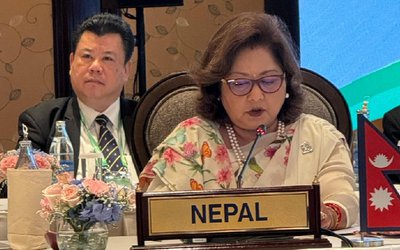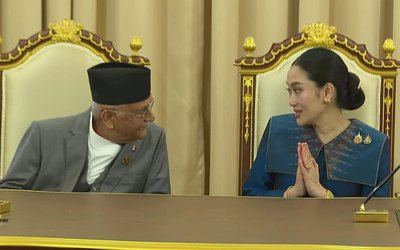
Political philosopher Nicolo Machiavelli’s 14th-century definition of intellectuals is still relevant in Nepal. Machiavelli, in his Prince, writes, “There are three classes of intellects: one which comprehends by itself; another which appreciates what others comprehend; and third which neither comprehends by itself nor by the showing of others; the first is the most excellent, the second is good, the third is useless.”
This is very much relevant in the context of the current Kalapani border impasse. Although it is a complex and complicated issue, which requires a thorough understanding and study of geography, statecraft,

Nepal Official Map
and politics, the third kind of intellectuals in Nepal have been at the forefront in Nepal. A group of people, who neither comprehends by itself nor by the showing of others, are taking the issue to the street.

Indian Political Map
Although the political boundary is always a sentimental issue to the citizens of the country, Nepalese are no exception. Being a citizen of a small country surrounded by two big countries, Nepalese are more sensitive towards their own existence as a citizen of an independent country.
However, an overwhelming number of Nepali citizens have been maintaining their silence when political leaders, intellectuals and student wings of political parties have been launching the tirade against the encroachment of the Kalapani border.
Concentrated in urban centers, the demonstrations, and marches against the issue of border encroachment confined to political parties and intellectuals or retired civil servants. In the whole episode, no common people have shown any interest and all the marches were orchestrated.
From media outlets to political leaders and intellectuals, Kalapani is still a hot cake for them. Although ruling Nepal Communist Party leaders do not use harsh languages, they have directed their student wing and youth leaders to carry demonstrations.
As it is said, old habits die hard. Although the communist party is enjoying political power, forming the central government, their party workers and leaders are yet to give up their old habit to harp the anti-Indian slogan to prove their nationalist stand.
“We will not allow an inch of land to have encroached from India,” said Co-chair of NCP Pushpa Kamal Dahal. “We will fight with any country which attempts to encroach our land,” echoed NCP vice president Bam Dev Gautam.
Unlike in the past, Nepali Congress and Federal Socialist Party, Terai based political party, are also at the forefront to raise the issue of Kalapani border overtaking Communists.
NC leader Sher Bahadur Deuba came out with harsh statements accusing Prime Minister K.P. Sharma Oli of handing out the border to India. The cadres of the Federal Socialist Party even burnt the effigy of Indian Prime Minister Narendra Modi in Janakpur.
The government’s response towards settling the issue is also sluggish. Although an all-party meeting gave it the mandate to settle the border issue with India through negotiations, the government led by PM K.P. Oli, who is hospitalized, is yet to take any concrete initiative.
Foreign minister Pradeep Kumar Gyawali, who was then on a visit to Russian Federation, reportedly sent a note to India’s Ministry of Foreign Affairs, India, which has been stressing the need to settle the issue through dialogue.
“The India-Nepal border is unique in that neither country has allowed a political boundary to interrupt the age-old traffic of people who share ties of kinship, religion, and culture. This is now being threatened by territorial nationalism on the Nepali side and an emerging security state on the Indian side,” writes former Indian foreign secretary Shyam Saran.
Former foreign secretary of Nepal Madhu Raman Acharya writes in his tweet,” To put the record straight on Sharan claiming Nepal to have dropped the 1950 agenda from the bilateral discussion, it was Sharan himself who lobbied for dropping the Kalapani and 1950 treaty from the joint statement during the 2003 visit of PM Deuba to India.
At a time when the majority of common people are in confusion and standing as silent spectators, both the governments have to start dialogue not to allow miscreant forces to fish in the troubled water.
The more the uncertainty over negotiations, the more vested interests and people with very little knowledge find space to misinform people destroying Nepal-India’s century’s old civilization-based relations.

Keshab Poudel
Poudel is the editor of New Spotlight Magazine.
- FM Dr. Deuba’s India Visit: Mission Aborted
- Mar 26, 2025
- AMBASSADOR MAEDA TORU: Warm Regards
- Mar 24, 2025
- PRO-MONARCHY MOVEMENT: Rising Dissatisfaction
- Mar 23, 2025
- Dr. PRABIN MANANDHAR: Person With Humility
- Mar 16, 2025
- US SUSPESION OF GRANT: Impact On Nepal
- Mar 10, 2025















